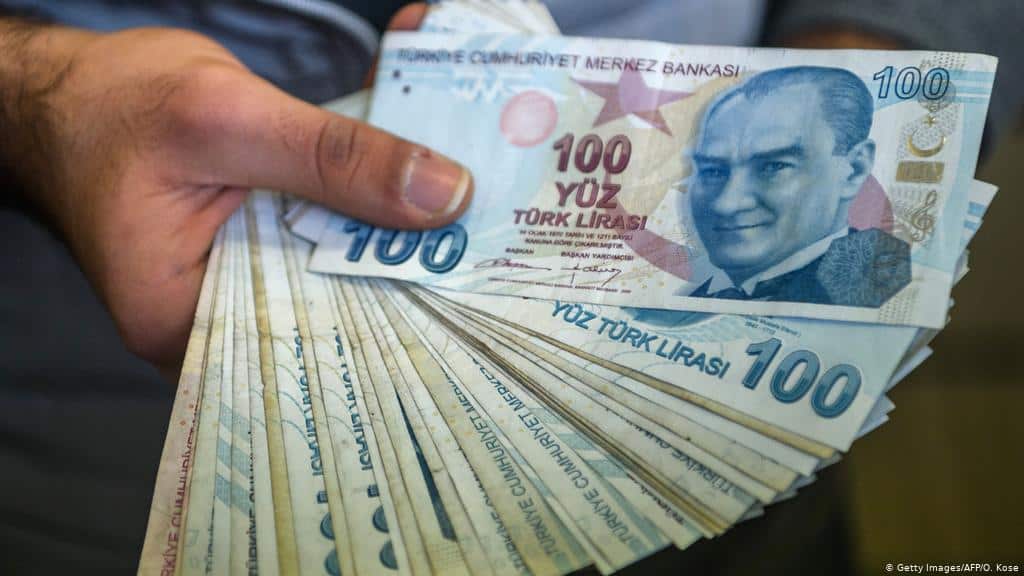Turkey’s sliding currency hit a new low on Tuesday, trading at a record 8.2 lira to the dollar late afternoon in London amid investor displeasure over the central bank’s stubbornness on interest rates and growing acrimony between Turkey and France.
“The market clearly not happy with CBRT’s approach on the rates side,” W. Brad Betchel, global head of foreign exchange at Jefferies, wrote in a note Tuesday referring to Turkey’s central bank.
The lira’s value has fallen by 20% year-to-date and halved since the end of 2017. At the start of 2018, a dollar bought just 3.77 lira; now analysts predict that figure will hit 8.5 or even 9.
The recent slide comes after the central bank last week declined to raise interest rates, surprising investors, and instead opted to hike its late liquidity lending rate to 14.75%. It announced its intention to focus on liquidity measures “until (the) inflation outlook displays a significant improvement,” despite pressure to raise its rates in order to counter its double-digit inflation. The benchmark interest rate for Turkey currently stands at 10.25%.
“It would have been difficult for the (central bank) to admit more clearly that it is not willing to take any measures to stabilize the inflation outlook and the Turkish lira against political pressure,” analysts at Commerzbank wrote in a note Tuesday.
Erdogan has previously defended his economic record and in September called interest rates the “tools of his enemies.” Over the summer he downplayed the lira’s slide, calling it “temporary.”
A fight with Macron … and a France boycott?
Adding to the slew of foreign confrontations that Turkey’s President Recep Tayyip Erdogan has intervened in this year, France’s President Emmanuel Macron is the latest target of Ankara’s ire. Erdogan on Monday urged Turks to boycott French goods after the country projected satirical cartoons of the Prophet Muhammad on government buildings in Paris to protest the terrorist killing of a French teacher who showed the images to his class.
Erdogan accused Macron of Islamophobia and said he needed “mental checks.” Macron, defending France’s move as an exercise of free speech, recalled France’s ambassador to Ankara.
Other flashpoints for Turkey include its involvement in conflicts in Libya and Syria, Eastern Mediterranean tensions over drilling rights, and, most recently, the fighting between Armenia and Azerbaijan in Nagorno-Karabakh. Ankara’s interventions, and its vocal support of political Islam, have pitted it against Middle Eastern countries including the UAE, Saudi Arabia and Israel, as well as NATO countries Cyprus, Greece and France.
In addition, its reported testing of the Russian S400 missile defense system, which it acquired against NATO’s consent, has the potential to draw sanctions from Washington, the risk of which casts yet another pall over the lira.
Turkey’s central bank ‘needs to wake up’
Erdogan’s unpredictability, as well as his grip on Turkey’s central bank, which has come to be seen as less independent in recent years, weigh on the currency.
Erdogan has defended the country’s monetary policy decisions, frequently calling interest rates “evil” and often refusing to let the central bank raise them, which is what most economists agree must be done in order to counter inflation, currently at just over 11% in Turkey.
“The CBRT needs to wake up pretty quick and hike policy rates or else the lira will hit the floor,” Timothy Ash, senior strategist at Bluebay Asset Management, wrote in an email note Tuesday.
“The lira is weak because the CBRT failed to do the obvious last week and hike the base rate … With the lira hitting 8.20 today, question is: Where is the floor? 8.50? 9+?”
The currency was already depreciating consistently against the dollar well before the coronavirus pandemic hit, but is now under more pressure as foreign exchange reserves shrink and the country’s tourism revenue gets eviscerated. Unemployment in Turkey is above 14%.
The country’s government has “squandered the trust placed in the central bank with its decision last week,” the Commerzbank analysts wrote, adding that any damage-control measures will have to be further reaching to convince markets that monetary policy will be “stability-orientated in the long term.”
“We are likely to see many more USD-TRY record levels before the required change in policy will finally follow,” they wrote.

